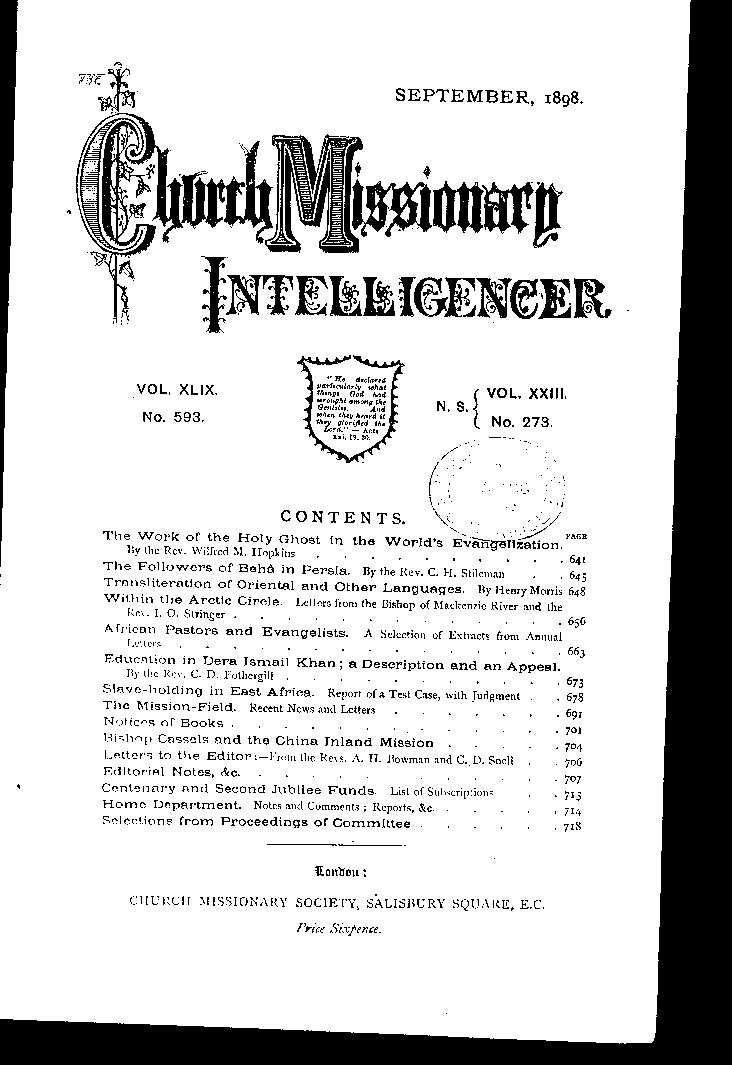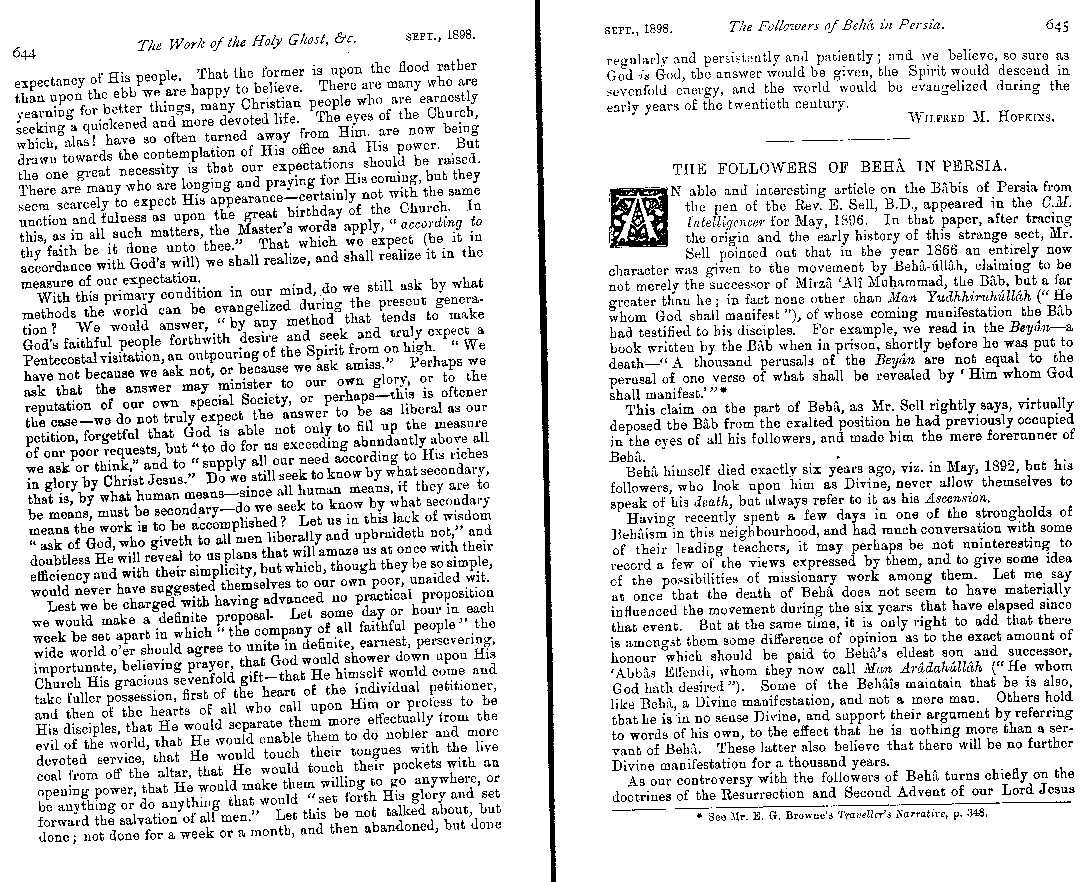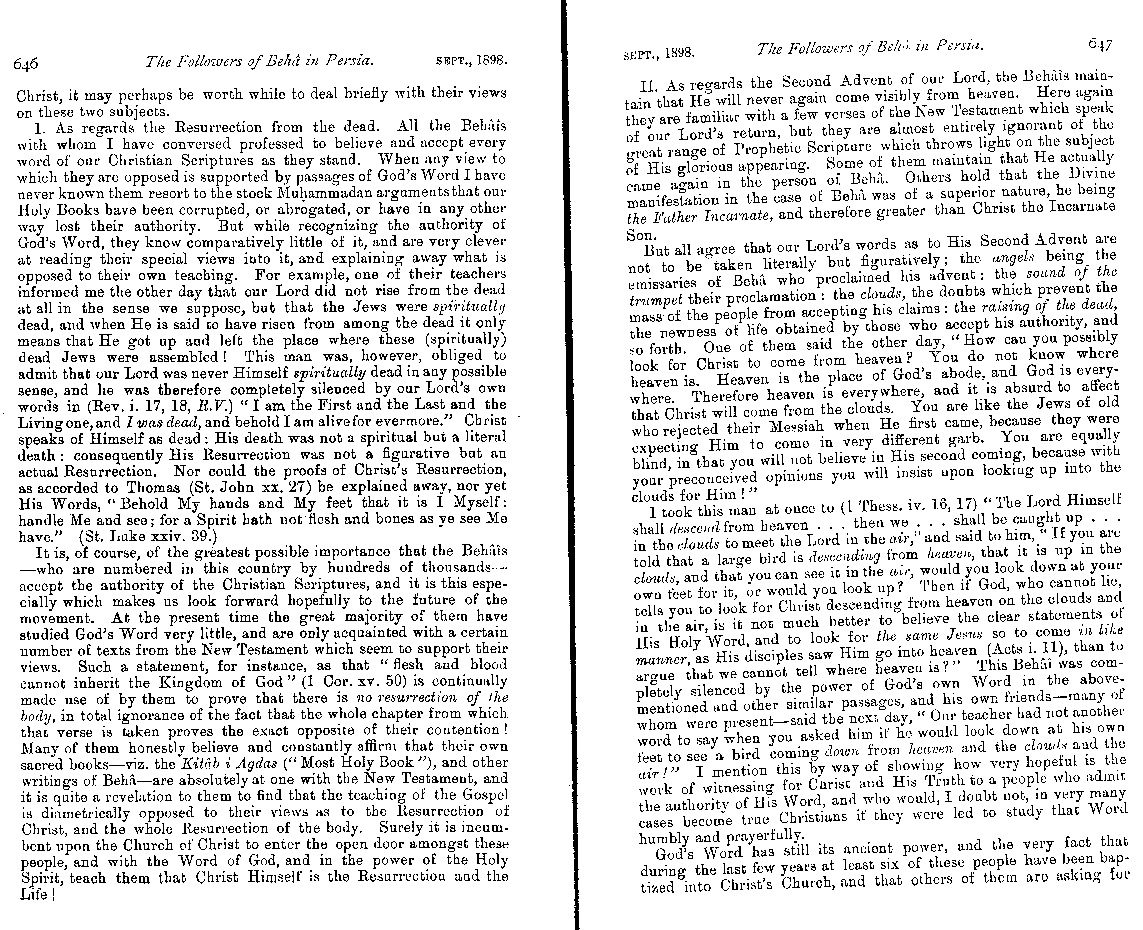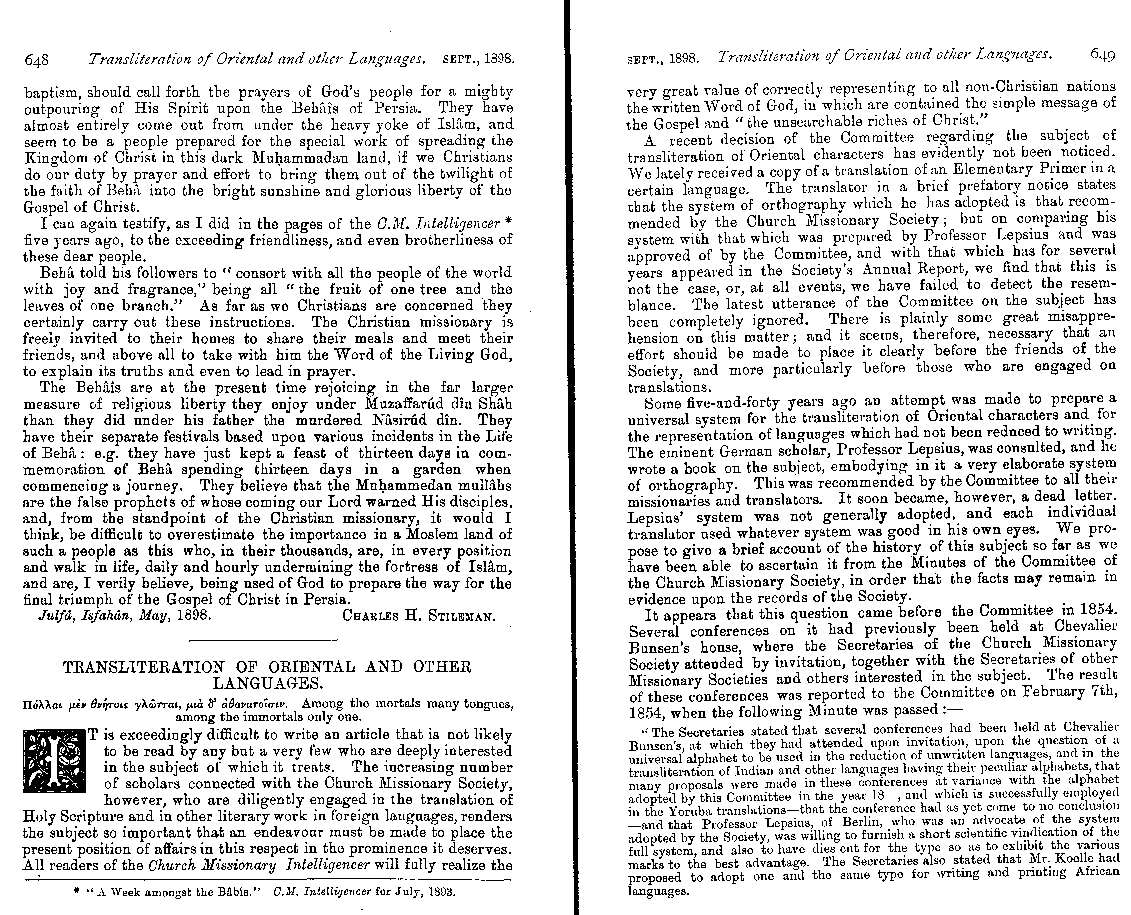
|
|
Abstract: A follow-up to the author's 1893 article "A Week with the Babis." |
The Followers of Beha in Persia
by Charles H. Stileman
published in Church Missionary Intelligencer, 49:593, 23:273, pages 645-648Salisbury Square: Church Missionary Society, 1898-09
1. Text
[page 645]- "He declared particularly what things God had wrought among the Gentiles And
when they heard it they glorified the Lord" - Acts xxi. 19,20.
This claim on the part of Beha, as Mr. Sell rightly says, virtually deposed the Bab from the exalted position he had previously occupied in the eyes of all his followers, and made him the mere forerunner of Beha.
Beha himself died exactly six years ago, viz. in May, 1892, but his followers, who look upon him as Divine, never allow themselves to speak of his death, but always refer to it as his Ascension.
Having recently spent a few days in one of the strongholds of Behaism in this neighbourhood, and had much conversation with some of their leading teachers, it may perhaps be not uninteresting to record a few of the views expressed by them, and to give some idea of the possibilities of missionary work among them. Let me say at once that the death of Beha does not seem to have materially influenced the movement during the six years that have elapsed since that event. But at the same time, it is only right to add that there is amongst them some difference of opinion as to the exact amount of honour which should be paid to Beha's eldest son and successor, `Abbas Effendi, whom they now call Man Aradahullah ("He whom God hath desired"). Some of the Behais maintain that he is also, like Beha, a Divine manifestation, and not a mere man. Others hold that he is in no sense Divine, and support their argument by referring to words of his own, to the effect that he is nothing more than a servant of Beha. These latter also believe that there will be no further Divine manifestation for a thousand years.
As our controversy with the followers of Beha turns chiefly on the doctrines of the Resurrection and Second Advent of our Lord Jesus
-
* See Mr. E.G. Browne's Traveller's Narrative, p. 348.
[page 646]
Christ, it may perhaps be worth while to deal briefly with their views on these two subjects.
I. As regards the Resurrection from the dead. All the Behais with whom I have conversed professed to believe and accept every word of our Christian Scriptures as they stand. When any view to which they are opposed is supported by passages of God's Word I have never known them resort to the stock Muhammadan arguments that our Holy Rooks have been corrupted, or abrogated, or have in any other way lost their authority. But while recognizing the authority of God's Word, they know comparatively little of it, and are very clever at reading their special views into it, and explaining away what is opposed to their own teaching. For example, one of their teachers informed me the other day that our Lord did not rise from the dead at all in the sense we suppose, but that the Jews were spiritually dead, and when He is said to have risen from among the dead it only means that He got up and left the place where these (spiritually) dead Jews were assembled! This man was, however, obliged to admit that our Lord was never Himself spiritually dead in any possible sense, and he was therefore completely silenced by our Lord's own words in (Rev. i. 17, 18, R.V.) "I am the First and the Last and the Living one, and I was dead, and behold I am alive for evermore." Christ speaks of Himself as dead: His death was not a spiritual but a literal death: consequently His Resurrection was not a figurative but an actual Resurrection. Nor could the proofs of Christ's Resurrection, as accorded to Thomas (St. John xx. 27) be explained sway, nor yet His Words, "Behold My hands and My feet that it is I Myself: handle Me and see; for a Spirit hath not flesh and bones as ye see Me have." (St. Luke xxiv. 39.)
It is, of course, of the greatest possible importance that the Behais - who are numbered in this country by hundreds of thousands - accept the authority of the Christian Scriptures, and it is this especially which makes us look forward hopefully to the future of the movement. At the present time the great majority of them have studied God's Word very little, and are only acquainted with a certain number of texts from the New Testament which seem to support their views. Such a statement, for instance, as that "flesh and blood cannot inherit the Kingdom of God" (1 Cor. xv. 50) is continually made use of by them to prove that there is no resurrection of the body in total ignorance of the fact that the whole chapter from which that verse is taken proves the exact opposite of their contention! Many of them honestly believe and constantly affirm that their own sacred books - viz. the Kitab i Agdas ("Most Holy Book "), and other writings of Beha - are absolutely at one with the New Testament, and it is quite a revelation to them to find that the teaching of the Gospel is diametrically opposed to their views as to the Resurrection of Christ, and the whole Resurrection of the body. Surely it is incumbent upon the Church of Christ to enter the open door amongst these people, and with the Word of God, and in the power of the Holy Spirit, teach them that Christ Himself is the Resurrection and the Life!
[page 647]
II. As regards the Second Advent of our Lord, the Behais maintain that He will never again come visibly from heaven. Here again they are familiar with a few verses of the New Testament which speak of our Lord's return, but they are almost entirely ignorant of the great range of Prophetic Scripture which throws light on the subject of His glorious appearing. Some of them maintain that He actually came again in the person of Beha. Others hold that the Divine manifestation in the case of Beha was of a superior nature, he being the Father Incarnate, and therefore greater than Christ the Incarnate Son.
But all agree that our Lord's words as to His Second Advent are not to be taken literally but figuratively; the angels being the emissaries of Beha who proclaimed his advent: the sound of the trumpet their proclamation: the clouds, the doubts which prevent the mass of the people from accepting his claims: the raising of the dead, the newness of life obtained by those who accept his authority, and so forth. One of them said the other day, "How can you possibly look for Christ to come from heaven? You do not know where heaven is. Heaven is the place of God's abode, and God is everywhere. Therefore heaven is everywhere, and it is absurd to affect that Christ will come from the clouds. You are like the Jews of old who rejected their Messiah when He first came, because they were expecting Him to come in very different garb. You are equally blind, in that you will not believe in His second coming, because with your preconceived opinions you will insist upon looking up into the clouds for Him!"
I took this man at once to (1 Thess. iv, 16, 17) "The Lord Himself shall descend from heaven... then we... shall be caught up.. in the clouds to meet the Lord in the air, and said to him, "It you are told that a large bird is descending from heaven, that it is up in the clouds, and that you can see it in the air, would you look down at your own feet for it, or would you look up? Then if God, who cannot lie, tells you to look for Christ descending from heaven on the clouds and in the air, is it not much better to believe the clear statements of His Holy Word and to look for the same Jesus so to come in like manner, as His disciples saw Him go into heaven (Acts i. 11), than to argue that we cannot tell where heaven is?" This Behai was completely silenced by the power of God's own Word in the above mentioned and other similar passages, and his own friends - many of whom were present - said the next day, "Our teacher had not another word to say when you asked him if he would look down at his own feet to see a bird coming down from heaven and the clouds and the air!" I mention this by way of showing how very hopeful is the work of witnessing for Christ and His Truth to a people who admit the authority of His Word, and who would, I doubt not, in very many cases become true Christians if they were led to study that Word humbly and prayerfully.
God's Word has still its ancient power, and the very fact that during the last few years at least six of these people have been baptized into Christ's Church, and that others of them are asking for
[page 648]
baptism, should call forth the prayers of God's people for a mighty outpouring of His Spirit upon the Behais of Persia. They have almost entirely come out from under the heavy yoke of Islam, and seem to be a people prepared for the special work of spreading the Kingdom of Christ in this dark Muhammadan land, if we Christians do our duty by prayer and effort to bring them out of the twilight of the faith of Beha into the bright sunshine and glorious liberty of the Gospel of Christ.
I can again testify, as I did in the pages of the C.M. Intelligencer five years ago [online here], to the exceeding friendliness, and even brotherliness of these dear people.
Beha told his followers to "consort with all the people of the world with joy and fragrance," being all "the fruit of one tree and the leaves of one branch." As far as we Christians are concerned they certainly carry out these instructions. The Christian missionary is freely invited to their homes to share their meals and meet their friends, and above all to take with him the Word of the Living God, to explain its truths and even to lead in prayer.
The Behais are at the present time rejoicing in the far larger measure of religious liberty they enjoy under Muzaffarud din Shah than they did under his father the murdered Nasirud din. They have their separate festivals based upon various incidents in the Life of Beha: e.g. they have just kept a feast of thirteen days in commemoration of Beha spending thirteen days in a garden when commencing a journey. They believe that the Muhammedan mullahs are the false prophets of whose coming our Lord warned His disciples, and, from the standpoint of the Christian missionary, it would I think, be difficult to overestimate the importance in a Moslem land of such s people as this who, in their thousands, are, in every position and walk in life, daily and hourly undermining the fortress of Islam, and are, I verily believe, being used of God to prepare the way for the final triumph of the Gospel of Christ in Persia.
- Julfa, Isfahan, May, 1898
Charles H. Stileman.
2. Image scans (click image for full-size version)

|
|


